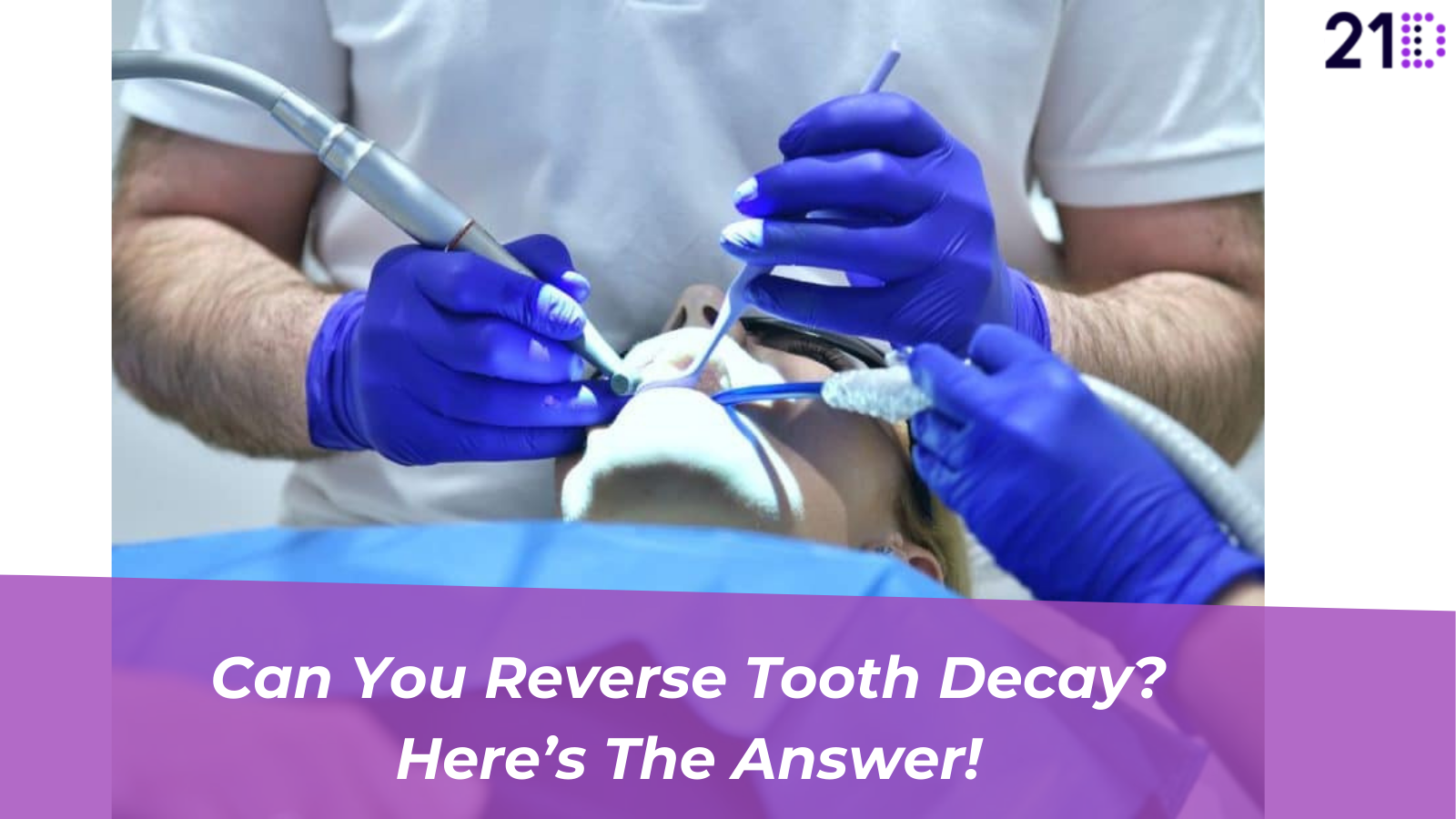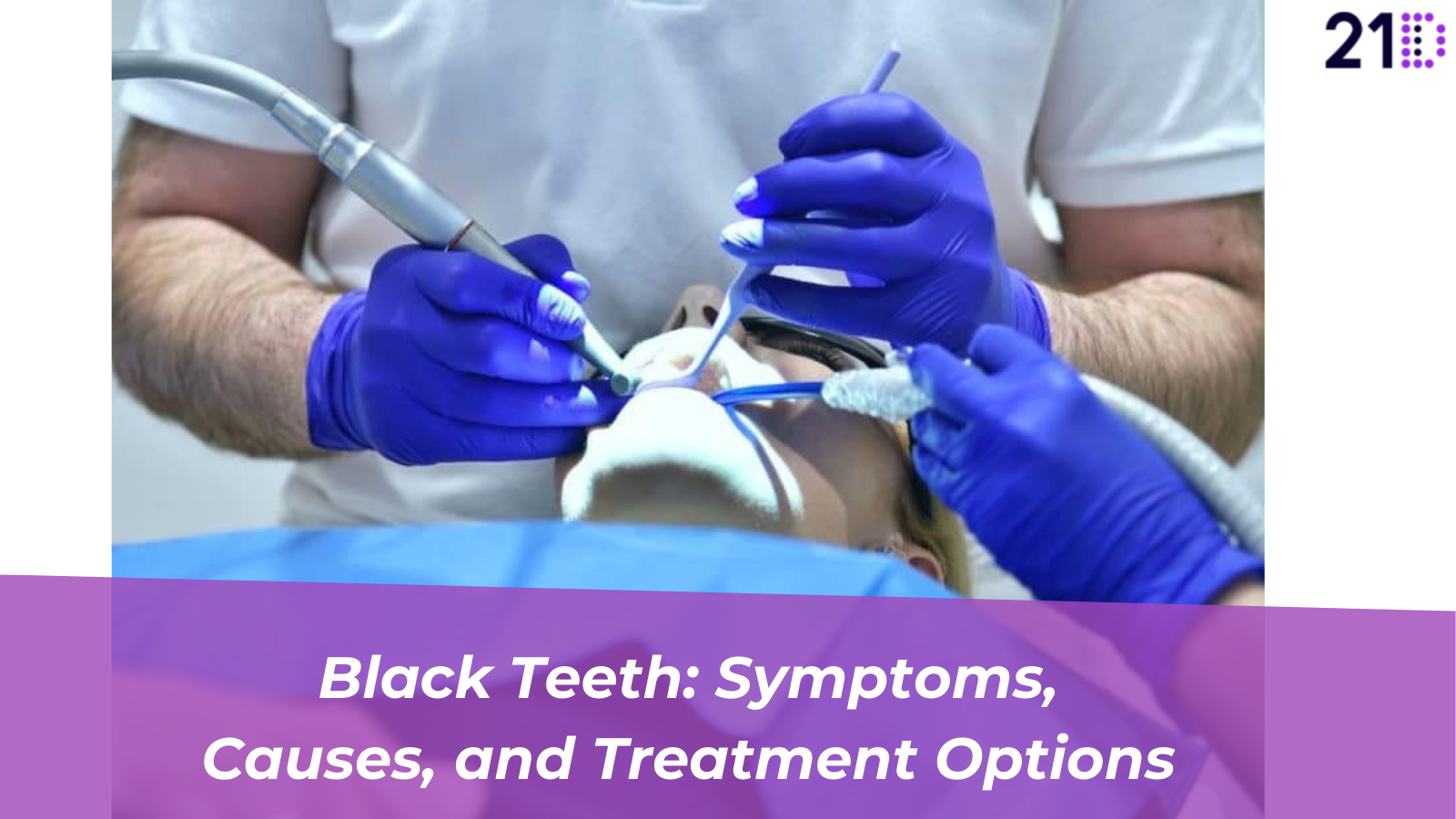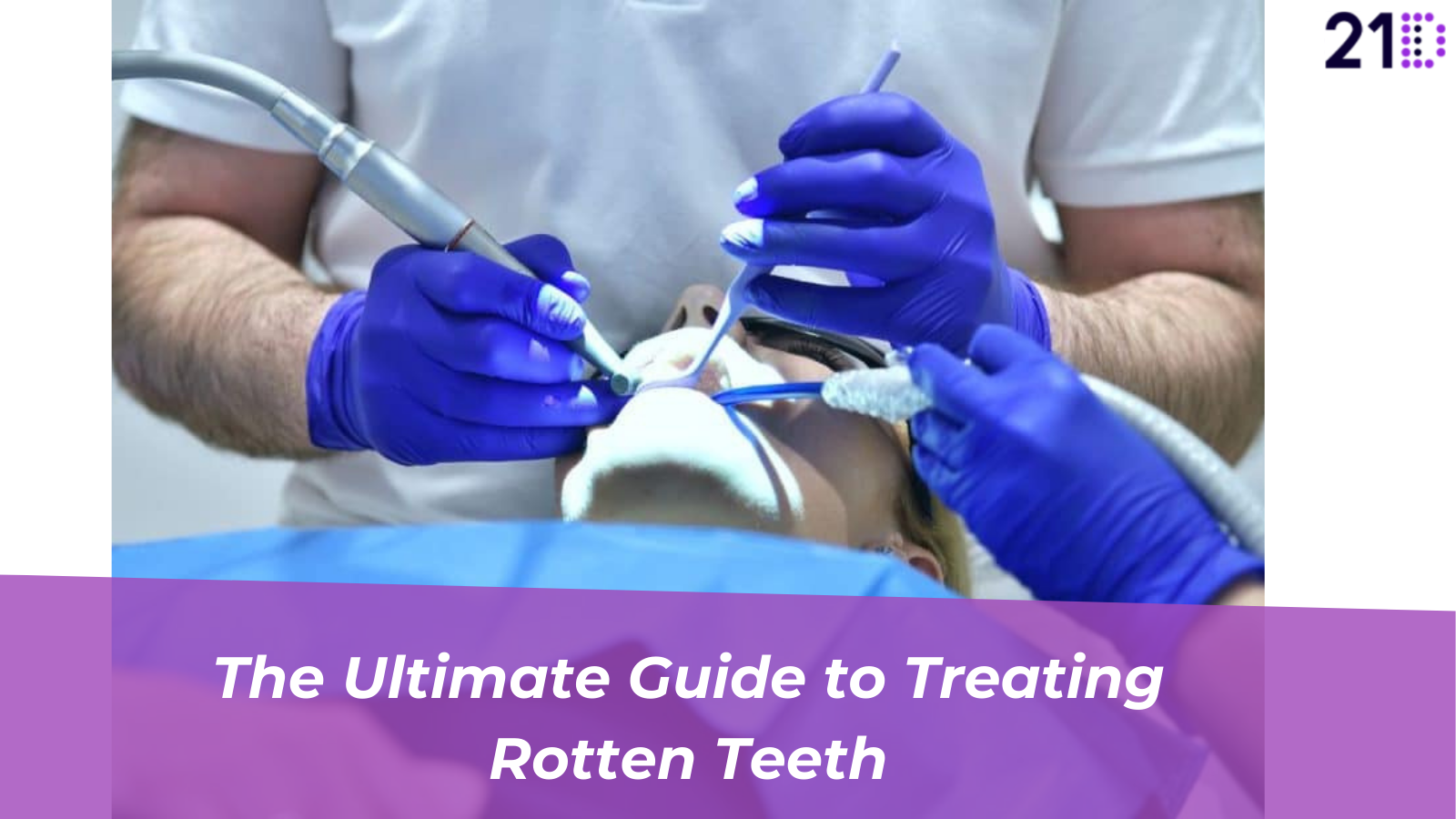Let’s face it: no one enjoys dealing with rotten teeth. Beyond the discomfort and potential throbbing pain, they can put a real damper on your day-to-day life. Whether it’s wincing at the sight of a cold can of pop or struggling to chew your favourite curry, rotten teeth can affect everything from how you eat to how you feel about yourself.
Rotten teeth, also known as cavities or tooth decay, are caused by damaged areas resulting from plaque build-up. It is a sticky film containing bacteria that thrive on sugary food particles left in the mouth after a meal.
The bacteria produce acid that erodes the tooth’s outer layer, known as enamel. The more the bacteria feast on the sugary particles, the deeper the damage goes, leading to pain, sensitivity, and difficulty eating. Thanks to modern-day dentistry, there are several ways to treat your rotten tooth.
In this article, we will explore the answer to the question, “I have really bad teeth what are my options for treatment?”
Signs Of Rotten Teeth
The signs of rotten teeth can manifest differently depending on their number and location within your mouth. In the initial stages, you might not experience any noticeable symptoms. However, as the decay progresses, you may start to observe:
Toothache
This is the most prominent symptom but can also be the most frustrating. Pain from a rotten tooth can be constant or come and go, sharp or dull. The pain can sometimes radiate to your jaw, ear, or head.
Sensitivity
Does your breath catch in your throat when you bite down on an ice cube? Or a sip of hot coffee may send shivers down your spine. Sensitivity to hot, cold, sweet, or sour foods can indicate that decay has reached the dentin, the layer beneath your tooth’s enamel.
Discoloration
Watch for changes in your tooth’s colour. Brown, black, or white spots can all indicate decay. In some cases, the tooth may even appear visibly cracked or chipped.
Bad Breath (Halitosis)
We all experience bad breath occasionally, but a persistent foul odour can be a sign of a rotten tooth, especially if a metallic taste in your mouth accompanies it.
Swollen Gums
Healthy gums should be pink and firm. If your gums are red, inflamed, or bleeding easily, particularly around a specific tooth, it could be a sign of an infection caused by a cavity.
It’s important to remember that not everyone will experience all these symptoms; sometimes, a rotten tooth might show no signs. That’s why regular dental check-ups are so crucial – they can catch problems early before they escalate. Hence, book a free consultation with our dental experts at 21D today!
Causes of Rotten Teeth
Toothaches, sensitivity, bad breath – rotten teeth can be a downer. But before we delve into eradicating them for good, let’s understand what might have caused the cavities in your mouth. Here are some of the main reasons behind tooth decay:
Sugar Rush
Most of us have a sweet tooth sometimes, but sugary foods and drinks are like rocket fuel for plaque bacteria. When these bacteria feast on sugar, they produce acid that attacks your tooth’s enamel. The more sugary treats you indulge in, the more acid is produced, increasing your risk of rotten teeth.
Plaque Buildup
Plaque is the sticky film that forms on teeth after eating. If it’s not removed through regular brushing and flossing, it can harden into tartar, which is even more challenging. Plague and tartar create a breeding ground for bacteria, accelerating rotten teeth.
Brushing Blunders
We all get busy, but paying attention to your oral hygiene routine is a recipe for trouble. Brushing twice daily for two minutes and flossing daily are essential for removing plaque and food particles before they can wreak havoc.
Dry Mouth
Saliva is vital in removing food debris and neutralising acids in your mouth. Certain medications, medical conditions, and even dehydration can contribute to dry mouth, leaving your teeth more vulnerable to decay.
Medications
Some medications can have side effects that reduce saliva production or increase your risk of cavities. Discuss any medicines you’re taking with your doctor or dentist if you’re concerned about them.
Cracked or Chipped Teeth
Damaged teeth can provide a cosy hideaway for bacteria, making them more susceptible to decay. Even a tiny chip can become a breeding ground for trouble.
Genetics
While oral hygiene plays a significant role, some people are more predisposed to cavities than others. If you have a family history of tooth decay, you should be extra vigilant about your oral care routine.
How Can You Fix Rotten Teeth?
Now that you’ve understood rotten teeth’ symptoms and causes, let’s explore the treatment methods. Modern dentistry offers a range of effective treatments to restore your oral health and get you smiling confidently again. Here’s a breakdown of some common answers to the question, “i have really bad teeth what are my options uk”:
Fluoride Treatment
A fluoride treatment might be just what the doctor ordered for mild cavities. Fluoride strengthens tooth enamel, helping to reverse early decay and prevent further damage. This painless treatment can be done in-office by your dentist or incorporated into your at-home routine with fluoride toothpaste or mouthwash.
Fillings
A filling can restore the damaged tooth structure if the decay hasn’t progressed. Fillings come in various materials, and your dentist will recommend the best option based on the location and severity of the cavity. The process usually involves removing the decayed material and filling the cavity with a tooth-coloured composite resin or other material.
Root Canals
When rotten teeth reach the deeper layers of your tooth, it can infect the pulp, the soft tissue containing nerves and blood vessels. This can cause significant pain and discomfort. A root canal involves:
- Removing the infected pulp.
- Cleaning the inside of the tooth.
- Sealing it with a filling.
While root canals might sound daunting, they are a routine procedure that can save your tooth and alleviate pain.
Extractions
Extraction may be best when the tooth is severely damaged or infected. While losing a tooth is never ideal, modern dentistry offers solutions to replace missing teeth, such as dentures or implants, to restore your smile and chewing function.
Dental Implants
If a tooth extraction is necessary, dental implants offer a long-term solution for replacing the missing tooth. Implants are small titanium posts surgically placed in your jawbone to act as artificial tooth roots. A custom-made crown is attached to the implant, creating a natural-looking and fully functional tooth replacement.
Remember, the best treatment for a rotten tooth depends on the severity of the decay. Early detection and treatment are vital to saving your tooth and minimising discomfort.
Why Are Dental Implants The Best Option After Tooth Extraction Due To Rotten Teeth?
Rotten teeth can lead to teeth extraction, leaving you with a gap in your smile and concerns about how to restore your chewing function. While different options exist for replacing your rotten tooth, dental implants are often the best. Here’s why:
Preserving Jawbone Health
The roots of your teeth play a crucial role in stimulating your jawbone. When a tooth is extracted, this stimulation is lost, which can lead to bone loss over time. This can affect the shape of your jaw and face and compromise the surrounding teeth’ stability. Dental implants act as artificial tooth roots, help preserve jawbone health and prevent bone loss.
Long-Term Solution
Unlike dentures or bridges, which may need to be replaced every 5-10 years, dental implants are built to last a lifetime with proper care. They are incredibly durable and can withstand the wear and tear of everyday chewing and biting. In the long run, it translates to significant cost savings, as you won’t need to worry about repeated replacements.
Natural Look and Feel
Dental implants are designed to mimic the look and feel of natural teeth. The custom-made crown seamlessly integrates with your smile, and the implant provides a stable foundation that feels like a natural tooth root. It can boost your confidence and allow you to eat, speak, and smile without hesitation.
Improved Oral Health
Dental implants stand alone, unlike traditional bridges, which require altering healthy teeth to support the replacement tooth. It means your surrounding healthy teeth remain untouched, minimising the risk of future problems. Also, implants make it easier to maintain good oral hygiene because you can brush and floss them like natural teeth.
Remember, select the best dental implant clinic to treat your rotten teeth. This can help you have a smooth dental implant surgery experience.
Why Choose 21D As Your Dental Implant Clinic?
Rotten teeth can leave you with a void in your smile and a wish for a confident bite. In severe conditions, they can result in tooth extraction, which can further degrade your self-confidence. At 21D, we understand the impact missing teeth can have on your daily life.
Therefore, we are dedicated to providing a modern approach to dental implants, offering a faster, more straightforward, and more effective solution to restore your smile and confidence.
Faster Treatment: At 21D, we use a fully digital dental implant process contributing to same-day teeth fixation. Our treatment process consists of 1 surgical appointment and 3 non-surgical visits.
Simplified Experience: At 21D, we aim to simplify the implant journey for patients, minimise the number of appointments, and ensure a stress-free experience.
Cost-Effective Solutions: Our focus on efficiency lowers costs compared to traditional implant treatments. We also offer flexible payment plans to make this life-changing treatment accessible.
At 21D, a smile can be a source of joy and happiness. So, if you want to get your rotten teeth treated by expert clinicians, book a free consultation at 21D today!
Conclusion
Rotten teeth can be a nuisance, but you can reclaim a healthy and confident smile with proper treatment. This guide explored the causes of tooth decay, treatment options, and the benefits of dental implants for replacing missing teeth.
Remember, early detection is critical! Schedule regular dental check-ups at 21D, and don’t hesitate to address any concerns you have. With the right approach and the help of our qualified dentist, you can achieve a healthy mouth and a smile you’ll love to share.




